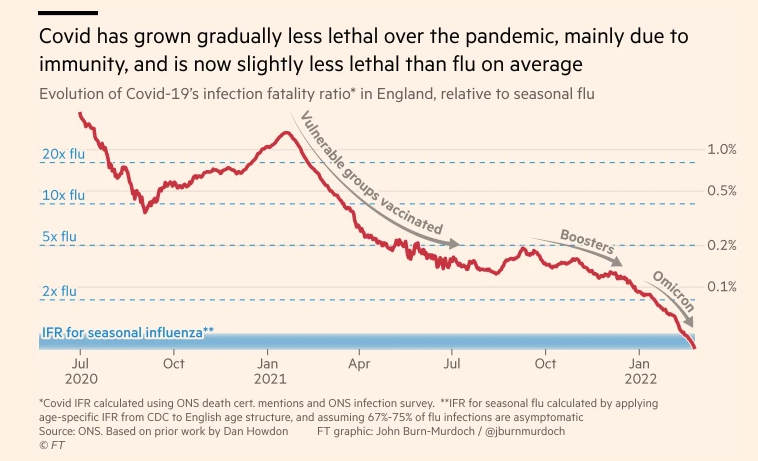Many corporations have suspended operations in Russia. Many have been lauded as having an ethical compass. But I wonder whether this behavior, especially concerning medications, will come back to bite us? After all, much if not all the precursors for our pharmaceuticals come from India and China. The latest to take a stand is Eli Lilly. Here is the headline:

I would call that virtue-signaling more than a moral compass. Here is the take by Dr. Milton Packer, Why Have Pharmaceutical Giants Continued Their Operations in Russia?

“A combination of high levels of immunity and the reduced severity of the Omicron variant has rendered Covid-19 less lethal than influenza for the vast majority of people in England, according to a Financial Times analysis of official data. But the speed with which Omicron infects people still pushed the total number of deaths this winter whose underlying cause was a main respiratory disease to 9,641 since the first week of January, 50 percent higher than in a typical flu season despite lower levels of social mixing, the Office for National Statistics figures revealed.”
Before rushing to that fourth booster, let’s get a better sense of what COVID is doing now. From the Financial Times, Vaccines and Omicron mean Covid now less deadly than flu in England
“In 2003, Wagner James Au was a young freelance writer in the Bay Area covering massive multiplayer games like The Sims Online for Salon and Wired. During that time, he got an assignment to review a new virtual-world game called Second Life, made by a company called Linden Lab. He started poking around this nascent digital world and, soon after, met the developers, who made him an interesting offer to embed as a reporter inside the game. Au had complete editorial freedom to cover everything Second Life, including weird goings-on, harassment, and cybercrime. Eventually, Au wrote one of the definitive books on the game, The Making of Second Life: Notes From the New World. He still exhaustively covers developments in Second Life on his blog, New World Notes, the longest-running metaverse news site. One of his most recent posts is about Russian Second Lifers who run digital businesses in the game, and are now trying to escape sanctions by fleeing the country.”
What the hell is the Metaverse? Should I care? Here is an interview that will answer some questions you might or should be asking. From The Atlantic by way of one of its newsletters, Galaxy Brain, Lessons From 19 Years in the Metaverse
“By reading history, I have learned that history and science are of equal importance. At the same time, history is not a science: It is not the accumulation of facts but the relation of them. Facts relating to the past, when they are collected without some intuition of possible meaning, some hunch, are merely compilations, and compilations are no more history than oil and canvas are a painting. In this respect, history is more like art. Yet when crafting a history, how much, and what, should the historian leave out? Historians face the same problem that bedevils artists: They never get it exactly right in every way. Patient histories, like portraits, can never be completely accurate, although doctors depend on them.”
This one drew me in immediately; medicine is indeed an art. From the Hedgehog Review, Medical Humanities and the Specialist - The art of medicine is the art of thinking.




